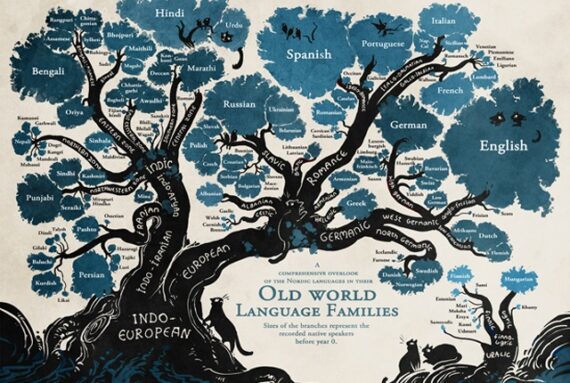Did you know: Before coins and other forms of token money were invented, many societies commonly used cattle as currency and an indicator of wealth. In India, for instance, the term pasu-dhan (पशु-धन) has been in use since ages; in Ireland, “cattle…were used as currency up to around 1400 CE, long […]
Word Origin Stories
Did you know: Latin nebula (mist or fog), Sanskrit nabhas- (cloud, mists, sky) and Greek nephos (cloud) all come from the same root word. Sanaskrit nabhas- later evolved into nabh (नभ) in Hindi, used, for instance, in these famous lines from Harivansh Rai Bachchan’s Madhushala (मधुशाला) तारक मणियों से सज्जित नभ बन जाए मधु का प्याला सीधा […]
School curriculum in ancient Greece was divided into three categories: writing, music and gymnastics. At the age of six, the child was enrolled in a school run by a professional schoolmaster. The day typically started with classes on writing, reading and arithmetic. This was followed by a music class in […]
Did you know: Texture, which we use in phrases such as this cloth has a fine texture to refer to how it ‘feels’ against our skin, derives from the Latin word texere, which means, to weave. Texture is also sometimes used more broadly to mean ‘distinctive quality’, as in the texture of life […]
Did you know: Prolific comes from French prolifique, which is in turn derived from Latin proles (progeny or offspring) + root of facere (to make). A prolific artist, thus, is one who makes/produces many works of art and prolific growth signifies abundant growth. From the same root we also get the word proliferate (multiply, grow fast), […]
The story of humankind and its progression through the ages is a fascinating one; and language, one of humankind’s ‘bosom friends’, has been a constant witness to the unfolding of this tale – in fact, not merely has it witnessed the story, but it has played a key role in […]
Vir, in Latin, refers to a man and virilis to being manly or worthy of a man. This root later evolved into virile and virility in English, which has come to refer to ‘masculine characteristics’ such as strength and vigour (esp sexual) and is now also sometimes used in expressions such as a […]
Some words, as a friend recently remarked, are delicately descriptive – they do not merely carry a ‘meaning’ but a lot more. Unfortunately, it becomes nigh impossible for someone who has not grown-up in the particular cultural milieu in which those words originated and were originally used, to understand them […]







